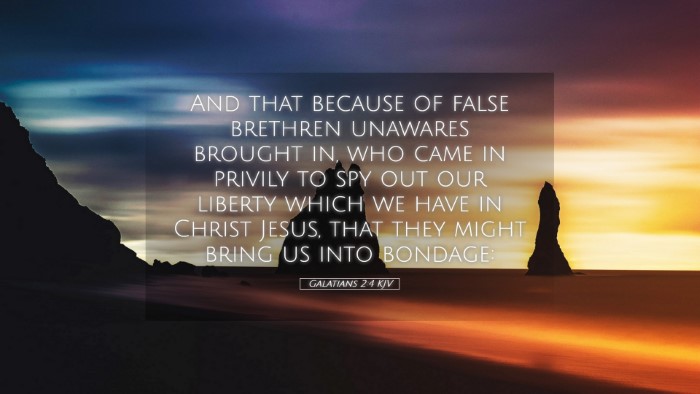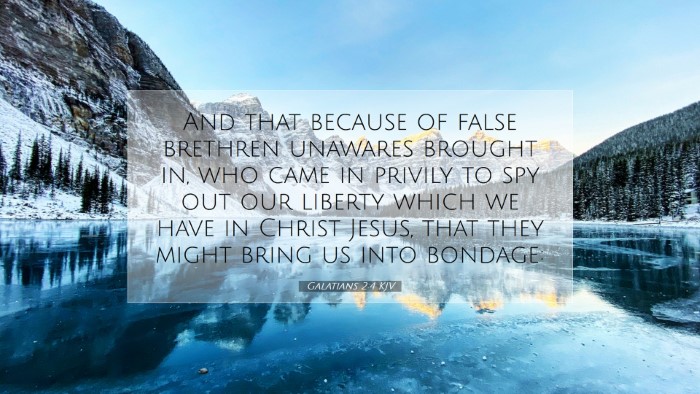Commentary on Galatians 2:4
Verse: "And that because of false brethren unawares brought in, who came in privily to spy out our liberty which we have in Christ Jesus, that they might bring us into bondage;" (Galatians 2:4, KJV)
Introduction
This verse is pivotal in understanding the context of Paul's epistle to the Galatians. It exposes the tension between the Gospel of grace and the legalism that threatened the early Church. Paul’s recount of the false brethren serves as an essential warning against those who distort the message of liberty found in Christ.
Contextual Analysis
Matthew Henry emphasizes the historical context of this letter, noting the Judaizers’ tactics to undermine the core tenets of the Gospel. The intrusion of false brethren highlights a critical struggle faced by the early church—maintaining the integrity of the message of salvation through faith.
False Brethren
According to Albert Barnes, the term "false brethren" refers to individuals who professed to be followers of Christ but were insidious in their intentions. They infiltrated the Church to impose Jewish customs and the Law, aiming to impose a legalistic framework contrary to the doctrine of grace.
Liberty in Christ
Adam Clarke notes the profound significance of the "liberty" that believers have in Christ Jesus. This liberty signifies freedom from the bondage of sin and the rituals of the Law. It is a divine freedom that allows believers to live a life of faith and obedience empowered by the Holy Spirit.
Theological Implications
- Defense of Christian Liberty: The verse underscores the essential defense of Christian freedom. Paul was adamant about preserving the liberty that Christ provides, which signifies a departure from works-based righteousness.
- Confrontation of Legalism: The presence of false brethren was not just a historical issue; it represents an ongoing challenge within the Church. Legalism undermines the sufficiency of Christ’s atonement.
- Community Vigilance: Paul’s experience illustrates the need for vigilance within the Church community. Believers must be discerning regarding teachings that deviate from the core message of grace.
Practical Applications for Today
Matthew Henry and Albert Barnes both conclude with practical exhortations for contemporary believers. The directive is clear; the Church must be a bastion of grace, emphasizing the truth that salvation is not based on human effort but solely on Christ’s finished work.
Guarding Against Infiltration
Church leaders must remain vigilant against teachings that dilute or distort the Gospel. This involves cultivating a strong doctrinal foundation and fostering an environment where the truth of Scripture is upheld.
Promoting True Liberty
Clarke urges believers to embrace and promote true liberty found in Christ, encouraging believers to live out their faith with joy and freedom, not as a burden but as a privilege.
Encouragement for the Faithful
In the face of opposition and false teachings, believers are encouraged to stand firm in their faith. Paul’s relentless pursuit of truth offers an inspiring model for all who seek to proclaim the Gospel effectively.
Conclusion
Galatians 2:4 serves not only as a historical account but as a timeless reminder of the struggle for theological clarity in the face of legalism. The insights from the public domain commentaries provide a rich tapestry of understanding, urging today's believers to uphold the liberty found in Christ and remain alert against teachings that threaten to ensnare the Church in bondage.


